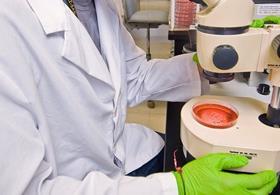
Members of the European fresh produce association, Freshfel Europe, in Germany, France, Netherlands and Switzerland have initiated steps to increase the amount of coordination and collaboration that exists between their respective quality and safety monitoring schemes.
Such monitoring usually covers a wide range of potential contamination and generally involves checking products for pesticide MRL compliance as well as according to other crtieria such as microbiological entities and additives.
According to a press release issued by Freshfel, the organisation's working group on fresh produce quality and safety has begun to look at what it describes as 'possible synergies, similarities and gaps' between the countries' four existing private food monitoring schemes for fresh fruit and vegetables.
The schemes involved are 4fresh in Germany, Food Compass in the Netherlands, FeLPartenariat in France and SOGUR in Switzerland.
Andreas Brügger, chairman of Freshfel's Food Safety and Quality Working Group, stated: 'The association will conduct in the coming weeks an inventory of the key operational aspects of the schemes looking at possible ways of increasing cooperation between these systems.'
He added: 'Possible synergies might still further reinforce the efficiencies of these schemes by approximating methodologies while considering also possible joint efforts with regard to technical equipments or communication.'
Commitment
The existence of such systems demonstrated the commitment of the sector to providing high quality and safety, as well as the diligent approach already being adopted by the sector, Freshfel continued.
Currently, the countries' own schemes review on a voluntary basis close to 10,000 samples of fresh produce each year.
These samples are in addition to approximately 60,000 samples that are taken on a yearly basis at member state level under the coordination of the European Food Safety Authority (EFSA).
Findings made by those private monitoring schemes are converging with the results of official EFSA reports, Freshfel revealed.
The new initiative and review remains an open exercise, Freshfel's statement added, and as such the association has called upon other similar schemes operating in Europe to join forces and contribute to the Freshfel review.
'This exercise is valuable and has many advantages for the industry but also from a governance perspective, commented Frederic Rosseneu, director for quality and sustainability at Freshfel Europe.
'The schemes allow for a quick access to data to evaluate the situation in case of emergence of a food safety crisis and provide authorities with professional data.'
He concluded: 'Having data available in a timely manner is of great help for discussions with public authorities when confronted with a crisis.'
Progress on the new collaborative framework is expected to be made during the course of the first semester of 2012.



